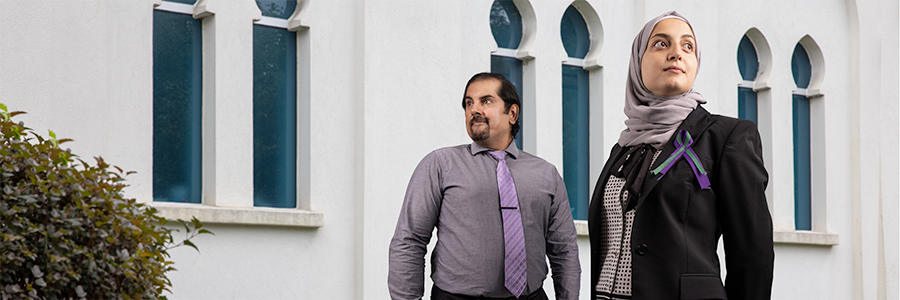Creating a table of belonging: Nusaiba Al-Azem, JD’18, and Nawaz Tahir, LLB’01, advocate against Islamophobia
November 18, 2021

On June 6, 2021, a Muslim family of five stood waiting to cross the street at a busy intersection in London, Ont. A man barrelled onto the curb in his truck and crashed into the family, killing all but the youngest child, in what officials have labelled a premeditated terrorist attack.
The tragedy plunged the London community into anger and mourning, and reopened the conversation about Islamophobia in Canada.
Nusaiba Al-Azem, JD’18, hosted a vigil, which drew thousands of mourners, in honour of the beloved family.
She expressed that while these targeted acts of violence wounded the Muslim community the most, everyone pays the price. “We all hurt when we continue to be fractured and allow conditions in which hate festers,” she said.
As a member of the London Muslim Mosque Board of Directors, Al-Azem collaborates with Muslim-focused mental health groups in the area. Integrating her previous roles as a solicitor at McKenzie Lake LLP and in social work, Al-Azem is uniquely positioned to serve as a bridge between corporate and not-for-profit spaces.
She helps provide legal and social assistance to organizations as they create culturally competent programs to better support Muslims in the community – particularly women and children.
“Our children are afraid of dying while attending school or praying,”she said.“This is not normal.”
Al-Azem will continue to advocate for Muslim Canadians in her new role as a staff lawyer for the National Council of Canadian Muslims, a not-for-profit organization that works to counter discrimination and Islamophobia.
“My hope is that I’ll be able to contribute valuable, positive change for our country, and to make life that much easier for a little girl who looks like me,” said Al-Azem.
Looking back, she credits her time at Western Law as being pivotal in her journey to becoming the advocate she is today.
“My professors opened my eyes to see that there wasn’t only one way to be a lawyer,” she recalled. “There is always room to be the kind of lawyer that aligns best with the kind of person you want to be and with the world you want to create.”
Elevating people like Al-Azem to positions of leadership is key to cross-cultural community growth, affirmed Nawaz Tahir, LLB’01, a partner at McCague Borlack LLP.
“Our elected officials have to be willing to lead the charge for change,” he said. “When policy-makers actively work toward inclusive leadership and progress, it sets an example for the private sector and opens new doors for collective healing.”
Tahir graduated from Western Law only months before the events of 9/11. In the wake of the tragedy, he co-chaired an international conference on campus focused on Islam and democracy. The conference welcomed speakers from across the globe to discuss topics such as Muslim women in leadership, how Muslims understand freedom, and how other nations implement democracy.
“It was an attempt to break down the ‘us versus them’ language many governments were using at the time,” Tahir said. “Those events presented an immediate application of the problem-solving skills I developed at law school. I was able to break down the problem of fear into manageable steps that allowed us to start carving a path forward.”
In the years after the conference, Tahir joined like-minded legal colleagues, Ingrid Mattson and Paul Nesbitt-Larking, in collating the speakers’ presentations into an edited essay volume titled Religion and Representation: Islam and Democracy. The book advances an ongoing effort to dispel many of the myths and misconceptions the world held against all Muslims based on the actions of a few, Tahir said.
When he’s not in the office, Tahir also serves as an active member on the boards of St. Joseph’s Hospital, the YMCA of Southwestern Ontario, and the Hikma Public Affairs Council. Currently, he is helping to create succession plans for each of these boards, ensuring that future leadership accurately reflects the needs of the community.
“Our biggest challenge is making sure diverse perspectives are represented and heard around the decision-making table,” Tahir said. “The people whose voices and abilities we need most are often those who don’t have large networks, making them harder — though not impossible — to find.”
The work of building a table no longer ruled by fear has been a long time in the making, and Al-Azem and Tahir continue to demonstrate perseverance in their respective leadership roles.
“For too long, discussions have been had about Muslims rather than with Muslims,” Al-Azem noted. Tahir agreed, adding, “It’s about belonging. This table belongs to all of us, and we all belong at this table.”
This story first appeared in the 2021 edition of the Western Law Alumni Magazine.






